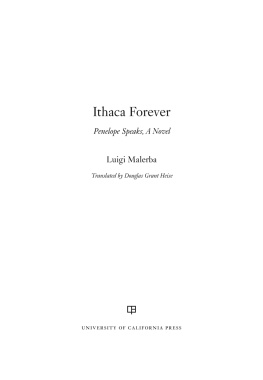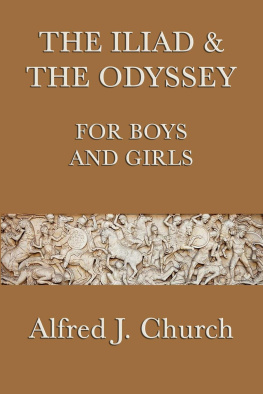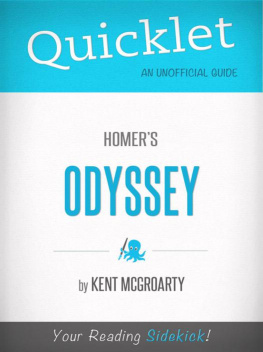University of California Press, one of the most distinguished university presses in the United States, enriches lives around the world by advancing scholarship in the humanities, social sciences, and natural sciences. Its activities are supported by the UC Press Foundation and by philanthropic contributions from individuals and institutions. For more information, visit www.ucpress.edu.
Names: Malerba, Luigi, author. | Heise, Douglas Grant, translator.
Title: Ithaca forever : Penelope speaks, a novel / Luigi Malerba translated by Douglas Grant Heise.
Identifiers: LCCN 2018059055 (print) | LCCN 2019003057 (ebook) | ISBN 9780520972810 | ISBN 9780520303683 (cloth : alk. paper)
Subjects: LCSH : Homer. Odyssey. EnglishFiction. | Odysseus, King of Ithaca (Mythological character)Fiction. | Penelope (Greek mythological character)Fiction.
Classification: LCC PQ 4873. A 42 (ebook) | LCC PQ 4873. A 42 I 8513 2019 (print) | DDC 853/.914dc23
PREFACE
Luigi Malerbaborn Luigi Bonardi but better known by his pseudonymwas born in November 1927 in Berceto, an Italian village in the Parma Apennines. Although he studied law at the University of Parma, he quickly became interested in cinema and soon began a collaboration with the Italian critical journal Cinema, bringing out his own series titled Sequenze, or Sequences: Notebooks on Cinema. He moved to Rome in 1950 and began working in screenwriting and directing, before publishing, in 1963, the novel La scoperta dell alfabeto (The Discovery of the Alphabet). This was followed in 1966 by Il serpente (The Snake) and in 1968 by Salto mortale (Somersault), which was nominated by Italo Calvino forand wonthe first Prix Mdicis in 1970. A distinguished and highly varied literary career followed, including the award of an honorary degree in Italian literature from the University of Parma in 1990 and the publication of Itaca per sempre (Ithaca Forever) with Mondadori in 1997. When Malerba died in May 2008, he left behind a corpus of more than forty literary works, which have been translated and published all over the world, and a reputation as one of the central figures of Italian twentieth-century writing.
Although Malerba has been given many labels, he is a notoriously difficult writer to categorize. He was associated for a time with the Italian literary movement Gruppo 63, a group of neo-avant-garde intellectuals and writers who first came together during a 1963 meeting in Palermo. And yet, as Michael Caesar writes, [Malerba] has never allowed himself to be captured by any single tendency or set of problems... [as an] author [he] is far too canny to allow himself to be stuck on any one track.
Certain features of Malerbas work and style, however, stand out. The first and perhaps most conspicuous is Malerbas focus on the slippage between fiction and reality, and his ability to play in his fiction with the boundaries between the two until they become indissoluble. His writing is filled with ironies and ambiguities, evidencing themes of disconnection and uncertainty in his earliest works; as Malerba commented, In the end, fictions and reality are mixed together.both of whom (Vergil and Dante) were themselves receivers of Homer.
It is thus to the intertextuality of Malerbas Ithaca Forever in particularits relationship both to Homer and to other reworkings of the Odyssey that we turn next.
Luigi Malerba was a polymath, interested in many different subjects, media, and approaches, from cinematography to journalism, from the power of language to the problems of politics. Above all, he was fascinated by the interconnection between lies and fiction: the power of stories to deceive and belie our expectations. Perhaps it was natural, then, that toward the end of his literary career he should be drawn to Odysseus, the man of many wiles, notorious for his cunning and capacious inventiveness.
Malerbas Ithaca Forever begins at the point, in book 13, where Odysseus arrives on Ithaca, alone, disorientated, unable to recognize his homeland. Whereas Homer has the island disguised from Odysseus by Athenas mist, and soon revealed to the hero, this Ithaca is a strange one that Odysseus know[s] should be Ithaca, but which [he] do[es] not recognize (p. 1). It is a land of strange, red sponge-like rocks (p. 1), arid and wild (p. 2) and circled by hawks, quite different from the verdant island he remembers. The novel opens, then, in uncertainty and indeterminacy, the gods absent, Ithaca unrecognized. The opening departure from Homers Odysseus, vouchsafed the knowledge of his homeland and sure of his return, sets a tone of troubling uncertainty and disruption that both mirrors the discord on land and begins a pattern of misrecognition and doubt that continues throughout the novel.
Ithacas identity is, however, confirmed a few pages later, not by a god as in HomerAthena is conspicuous by her absence, and the gods in this story are distant (p. 12)but by the swineherd Eumaios, who tells him, This is Ithaca, the homeland of Odysseus (p. 8). And as Odysseus gains certainty about his location on Ithaca, we move back to more familiar territory, following the plot line of the Odyssey with meticulous faithfulness. Odysseus meets with his son Telemachus; he takes on his disguise as a beggar (here, a decision made by Odysseus and not the gods, as a means to test Penelope); he returns to the palace, wins the contest of the bow, slays the suitors, and engages in the prolonged recognition with Penelope, culminating in his reinstatement to his position within Ithaca.
On the surface, then, Malerbas version is very similar to Homers narrativeand on the face of it the author is assiduous in his fidelity to the Odyssey, at times matching Homer scene for scene and almost word for word. Yet it is the very similarity of Malerbas Ithaca to Homer that lures us into a false sense of security, for as the novel progresses, the slight alterations that first appeared to hint at its difference from Homerthe absence of the gods, the unrecognizability of Ithacastart to diverge into rifts that pry open gaps in the Homeric narrative.
One of the best-known controversies surrounding Homers Odyssey is that of the characterization of Penelope, and in particular the question of when Penelope recognizes the disguised beggar as Odysseus. Penelopes character is notoriously ambiguous in the ancient epic, often apparently passive as she waits for Odysseus to return homeher son Telemachus describes her as neither denying a marriage that would be hateful to her, nor able to put an end to all this ( Od. 1.24950, 16.12627). At times she seems to have recognized the disguised beggar as Odysseus, as when, for example, she comments on the beggars similarity to her long-lost husband (19.35860); at others, she seems to encourage the suitors in their contest for her hand, beautifying herself to make their hearts flutter (18.16061). The recognition between Penelope and Odysseus is delayed again and again, in spite of several conversations between them in which they exchange news of Odysseus and portents of his return, and despite Odysseus recognition by his nurse, Eurycleia, as she washes him and notices a familiar scar (19.386498). Then Penelope, immediately after Odysseus the beggar has predicted his own return, announces a contest for her hand: the suitor to string Odysseus bow and shoot an arrow through the handles of twelve axes will become her husband. Does this mean that Penelope has recognized Odysseus and is giving him the opportunity to win her back? Or has she given up at the very moment at which she has been told Odysseus will return? Homer is silent.













